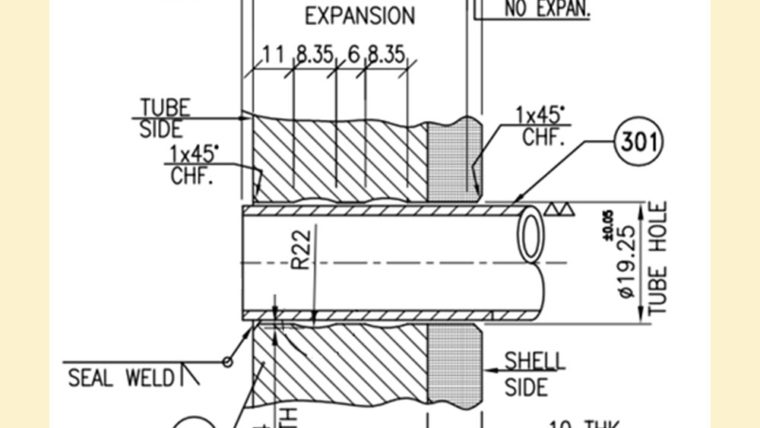Unlike a court case, a code case cannot be fought, but established with code authorities. Who, unlike in a court, are the judges themselves.

At TEMA India, we manufacture shell-and-tube heat exchangers as per the ASME code and cater to customers globally. Unlike any other equipment, a heat exchanger has two fluids at play; one running inside the tubes and the other outside (inside the shell). The fluids can be in a gaseous or liquid state, or a mixture of the two. A heat exchanger, therefore, has two pressure compartments in a single vessel. In other words, two separate pressure vessels in one.
The tube bundle is the most critical part of a shell-and-tube heat exchanger. TEMA India has special norms for the tube bundle construction and all manufacturing is in-house.
The reliability factor and the leak tightness of the tube-to-tube sheet joint determines the efficacy of the heat exchanger design. Therefore, the combination of the metallurgies involved in the tube-to-tube sheet joint has to be judiciously considered while arriving at its optimum configuration.

We recently were in a situation where the use of Inconel 625 tubes in high-pressure screw plug heat exchangers became necessary. Based on several years of manufacturing and servicing heat exchangers, we decided that Inconel 625 Grade 2 material would have to be used. This, despite the fact that Inconel UNS N06625 Grade 2 produced by solution-annealing heat treatment SB-443 Grade 2, SB-444 Grade 2 and SB-446 Grade 2 is not listed among the acceptable materials in Annexure 3 of ASME Sec VIII Div. 2. However, this material is acceptable as per UNF-23 of ASME Sec VIII Div. 1. ASME Code Cases 2468-1 and 2468-2 permit the use of annealed condition Grade 1 material for ASME Sec VIII Div. 2 equipment.
However, we strongly believed that Inconel 625 Grade 2, not Grade 1, was necessary to provide a reliable tube-to-tube sheet joint, for the following reasons.
1. Grade 1 tubes in the annealed condition are much harder and with high tensile properties, which in turn elevate the risk of corrosion in high-stress concentration areas such as the U-bends and the tube-to-tube sheet joint.
2. The solution-annealed Grade 2 tubes are comparatively softer, which increases the likelihood of achieving a sound-expanded tube-to-tube sheet joint.
3. Inconel UNS N06625 Grade 2 offers better manufacturability than the Grade1 variety.
This is reinforced by ASME Sec II Part A, Material Specification SB-444, which specifies the suitability of Grade 2 material for service temperatures above 593o C, as opposed to Grade1 material suitability up to 593o C. Recognising the necessity of Inconel UNS NO 6625 Grade2 tubes for the heat exchanger, we took up the matter with ASME.
We were in a catch-22 situation. On the one hand was the cost of carrying a huge inventory until the inspection was carried out, while on the other was the risk of damaging our reputation by supplying sub-standard equipment. However, we were optimistic about a favourable decision as we pioneered shell-and-tube exchangers in India in the year 1970.
We submitted our application for revision of code case 2468-1 on 12 March 2019. The case was reviewed and approved by the ASME body in India. Thereafter, the case was reviewed and passed by several ASME committees (Sec VIII SGM Materials Committee, Sec II Non-Ferrous Committee and External Pressure Committee) in the US, before the code case was approved by the ASME board.
All along, stakeholders had been compelled to adopt ASME Sec VIII Div. 1 wherever Inconel UNS N06625 Grade 2 was specified by the end users/process licensors. This, in turn, led to higher equipment cost on account of higher thickness and increased weight, as the allowable stresses of ASME Sec VIII Div. 1 are lower than that of Div. 2.
The licensor’s requirements of Grade 2 material were in imminent danger of non-compliance by the detailed engineering consultant company. The licensor would have had no option and would have had to settle for a lower heat exchanger quality using the Grade 1 tubes. Had TEMA India not stepped in and gone the extra mile, the licensor would have to succumb to the Detailed Engineering company; a situation with few precedents.
Creating a code case and successfully getting it through proves that TEMA India is many notches over competitors. The initiative can lead to the management of detailed engineering companies to take note of our ability to submit our value propositions, and thereby consider passing our name down the line, for RFQs for critical heat exchangers to their project execution teams.
TEMA India’s effort has benefitted the Oil & Gas and Petrochemical industries, including equipment manufacturers, tube manufacturers, engineering consultants, process licensors, turnkey contractors and end-users the world over.

Copyright © 2020 Haresh Sippy
(This article is subject to copyright.)

